#logical analysis
Explore tagged Tumblr posts
Text
Problem-Solving and Decision-Making: A Process-Driven Approach to Mastery
Since when I was a kid, think 5 years old, I discovered that I excelled in both problem-solving and decision-making. Later in life, I became aware that they also are fundamental to our human experience, shaping our lives, careers, and relationships. Photo by Andrea Piacquadio on Pexels.com They are often seen as skills one either possesses or lacks. However, a process-driven perspective reveals…

View On WordPress
#2-Minute Rule#5 Whys#anterior cingulate cortex#awareness#bias#Buddhism#buddhist wisdom#Continuous Improvement#convergent thinking#creative thinking#decision matrix#decision-making#default mode network#Dichotomy of Control#divergent thinking#DMN#Dopamine#dopaminergic system#Growth#hippocampus#insight#learning#logical analysis#logos#Madhyamaka#Middle Way#Neuroscience#non-attachment#prefrontal cortex#premeditatio malorum
2 notes
·
View notes
Text
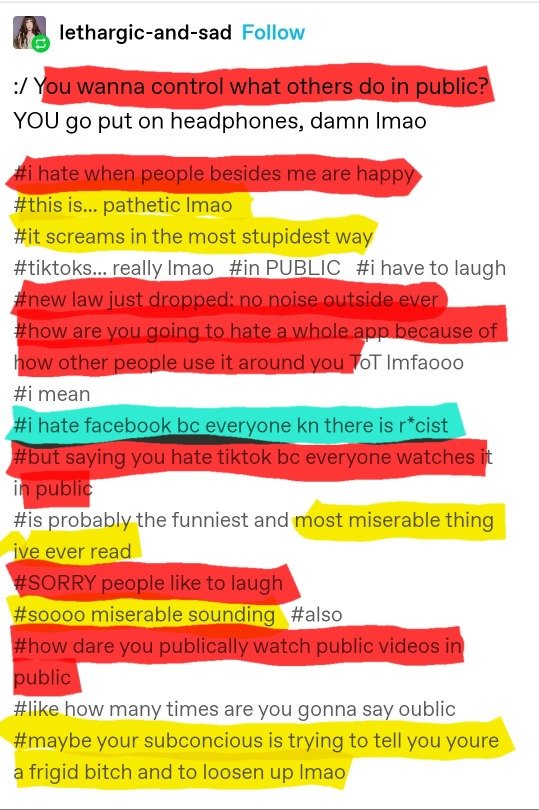
I've decided to start sharing my practice in identifying logical fallacies, aka "your argument is bad".
Red: Strawman argument. You are purposefully misunderstanding or misrepresenting the claim to make it easier to attack. Like fighting a straw man instead of a person.
Yellow: Ad Hoc/Ad Hominem. You are attacking the person instead of the claim. Just because you can insult someone doesn't make you correct.
Blue: Tu Quoque. Aka Hypocrisy Fallacy. You point out a flaw in someone else as evidence that their point is invalid. "You say society sucks, and yet you live in a society. Curious." Type shit. This particular one also feels like a strawman too, so bonus points I guess?
my unpopular opinion is that i hate tiktok because now people just publicly watch loud ass videos in public spaces with no regard for anyone else. 100% it was not this bad with youtube, it’s such a different thing with tiktok. put on headphones. you are grown.
306K notes
·
View notes
Text
I'm thinking of kris repeating berdly's name in shock when you try to tell ralsei that you are going to the festival with berdly of all people. Thinking about the conversations we only get to hear half of, where kris presumably tells ralsei and susie that ralsei and asriel don't look that much alike. Thinking about all the times where kris changes the prompt we give them into something that they'd prefer to say.
Kris talks. They chatter, even, but we as the player don't get to hear it. They don't get a text box. We only ever know that they spoke at all from the reactions of other characters, and even then, we rarely know exactly what was said.
And part of this is that whoever the deltarune narrator is seems intent to pretending like kris doesn't exist. You check the mirror, and it says, "it's only you". Kris plays the piano and it says, "your hands begin moving on their own." If kris speaks without your permission, the narration doesn't acknowledge it at all, committed to the lie that kris doesn't exist beyond their role as our vessel. But that's not what this post is about.
This post is about how it's entirely possible that kris has tried to talk to us when no one else is around. They could have tried to tell us their plan, or begged us not to make certain decisions, or explained that we don't actually need to steal asriel's 5 dollars because they have a piggy bank buried in the front yard. Kris could be asking us questions, or asking us not to look for the bunker password because they have a plan and we should trust them, or asking us to let them sleep a bit longer, and we the soul just carry on the same regardless, their one-sided monologue falling on deaf ears. We would never even know, because of how thoroughly the narrative of deltarune has denied kris a voice.
#deltarune#deltarune spoilers#kris dreemurr#kris deltarune#i love the comics of kris and the player having a chat#they are so good#I'm so invested in that drama in particular#But that's not actually the kind of horror that kris is living through#A big part of it is that kris can't communicate with us in any way that matters even if they tried#They could have made the attempt to reach out a thousand times and the game would look exactly the same to us#I think that I currently believe that the narrator is the second voice in the intro#by the bad media analysis logic of saying that every mystery has to be the same mystery#I don't know who the second voice in the intro is#and i also don't know who the narrator is#So they are probably the same guy#I mean#What are the odds that there are two mysterious characters running around?#*checks notes*#Oh. there's way more than that? there's also the first voice in the intro and also the knight and also the egg man?#Okay then
10K notes
·
View notes
Text
Can we spare a moment to appreciate how sweet Regen One Shockstar and their relationship is?

Regen One is a continuation of the original Marvel(US) comics.
By Regeneration One, They had both lost their bodily autonomy, Starscream didn't really have much awareness and could not speak anything coherently after being essentially lobotomized by Megatron and Shockwave couldn't tether himself from the ship because it had become a part of him.


They were both in horrible situations all around and helped eachother regain their autonomy, Shockwave removed the blocks Megatron had placed in Starscream's mind, but he did not have complete autonomy himself and required a pilot, and when Starscream volunteered to be that he did not once doubt that he wasn't being insincere at all and trusted him. Shockwave, somebody who is well known for prioritizing his logic over everything else trusted the one known notoriously for being a self serving backstabber knowing Starscream would not try to betray him and Starscream not disappointing his trust at all. And in return Starscream while being possessed by Underbase helped separate Shockwave from the Ark's body.


I think there is inherently something so sweet that this is one of the first Shockwaves who was actually emotionless at the start and throughout the series he gradually started to learn it, he actually sounds really excited to work with Starscream it's not even subtle, they were on and off partners in crime essentially.
By the time everything is over and done with, and the place was about to be destroyed Shockwave willingly with no ulterior motive decided to go back and save Starscream before they got into the ship and left, an action that surprised even himself, the first time he acknowledged that he ever felt emotion.

I am obsessed with this particular iteration of their dynamic they make me ill, their relationship can be everything you can think of whether you see them as friends, Qplatonic or more, the bond is there. It's someone who doesn't understand emotions and prioritizes logic and someone who has rarely ever had a geniune connection with anyone because he has a habit of self sabotaging every relationship he's ever had and has trouble understanding relationships outside of self gain. None of them really understand the need of forming connections besides for their own benefit yet they were still able to seamlessly work together.


It's two selfish people who for the most part prioritize their own self's survival over everyone else's, yet Shockwave still went back for Starscream. And this extended to others too as they later scoured Cybertron to see if anyone else was alive too and Starscream saved Ravage from zombie Soundwave. They were both broken people by that point, who have had a long history in the war and have fought alongside eachother for their own needs, by the time the dust settles they don't really have any fight left in them to continue the cruelty and decided to elope on the ship to have a vacation and help other species find peace, like they've discovered in eachother and their unconventional situation.
And for once that's enough. Their relationship is just so very sweet, they went from being colleagues to allies/partners to frenemies to straight up friends at the end, they're not even just tolerating eachother they geniunely enjoy the other's presence and come on it's sweet.
They ended up in an actually healthy relationship too. This is one of those ships where I'll say "you know what? Good for them"
That, and Ravage literally thinks they've both lost their minds because they've suddenly turned a 180 and became peace ambassadors after everything, honestly I don't blame him lmao. Imagine knowing these two and out of nowhere they suddenly start speaking for peace and unity, the three of them are the last decepticons alive, Starscream and Shockwave aren't really following the need of keeping the memories of the faction alive anymore so it's just Ravage.
#shockstar#them and their weird qpr situationship turned relationship#transformers#starscream#shockwave#regeneration one#tf regen one#tf regeneration one#tf g1#tf marvel comics#maccadam#maccadams#tf starscream#tf shockwave#I think about them so much#I love them#I am this close to writing a fanfic about them#you know what they say those who scheme together stay together lol#the world is ending and they are going to travel the universe having their dream life#it's so unconventional but I don't think they care#Ravage#mentioned#my emotionally constipated asexuals and their weird ahh situationship#analysis#transformers analysis#there's something so inherently beautiful about their relationship especially Shockwave's side#if the universe is ending trust shockwave to prioritize his logic and drag Starscream out of there#he did that in tfp too#they feel like the type of people who know how messed up the other is and go we can make eachother worse#and ironically made eachother better
150 notes
·
View notes
Text
One of my favorite details of all time in the ROTTMNT Movie is that when Casey Jr. is so angry, he either seems to not think right or does not care about hurting himself to unleash his anger. And it's so funny.
Consider the scene with Casey and Leo, the one after Casey chews him out.
After a little bit of time alone, Leo resolves to do better. While moving rubble, Casey finds a break in the wall with light shining through and understands it's a way out, so he focuses his efforts on that. Leo joins Casey at the top of the rubble pile, trying to help.

Casey is still steaming mad and gives Leo a hilarious glare before ramming into the wall to break it.
Now, remember where Casey's armor is. The shoulder armor is on his right. What shoulder does he use to ram into the stone wall?

His left.
Yep, he was so mad that he rammed into a stone wall with his unarmored shoulder when he has a perfectly good armored shoulder on the other side. This action also hurt him quite a bit, it seems, considering his expression.
(As a side note, it is true, you're really not supposed to ram your shoulder into things, you'll injure it. That's why it's common advice to kick doors down, not shoulder slam them. That's also why in contact sports, including hockey, people wear shoulder pads.)
It gets better, though. Clearly it hurt the first time so he wouldn't do it again, right? He can't be that stupid, right?
WRONG.

Casey is probably too angry and full of adrenaline to consider much or not try to hurt himself. So he rams into the wall the exact same way a second time. Really it's only when Leo tries to speak more openly here, admits his flaws, and agrees to work together that Casey pauses.
But wait, it gets even better. The third and final time when they break through the wall together...

HE'S STILL USING THE SAME SIDE TO SLAM THE WALL. 😭 He learned nothing. He just doesn't hurt himself too bad the final time because they successfully break through to the elevator shaft.

Not once within this scene did it occur to him to use his armored shoulder. Not once. Not even after it clearly hurt.
Casey Jr. truly is a gift. 💗
#god he really is so The Character to me#for a good reason#i love him sm#i've really tried to think of a logical reason why he might do this but i don't think there is one#he's just too angy#dislocate your shoulder when you don't need to#rottmnt#rise of the teenage mutant ninja turtles#rottmnt casey jr#rise casey jr#casey jr#casey jones jr#rottmnt leo#rottmnt analysis
630 notes
·
View notes
Text
wait wait wait we've seen this before. we've seen someone ignore the fears so hard that she survived a ritual. sure, alice is flippant like tim, but the way she just ignores and compartmentalizes the horrible things she's forced to witness is so much like basira.
#their personalities don't align much otherwise (as far as we know) but still!! think about it!!#basira (anti)logic-ed and ignored her way out of the unknowing!#tmagp#tmagp analysis#the magnus protocol#tma#alice dyer#tim stoker#basira hussain#bs.txt
1K notes
·
View notes
Text
beautiful orange dress patterned with fall leaves that Katniss thinks Peeta will love vs. clown suit she wears in the movie for the district 11 stop
#thg#was going to make some sort of analysis on this but i'm too annoyed to think about it logically#i hate a lot of the costuming for the movies lmao#they took the statement k makes about not knowing about fashion at face value when she loveeees to talk about the clothes she wears#she just doesn't know fabric types lol#katniss loves beautiful things it's like her whole deal#a big part of her journey is learning to stop running away from beauty and art
115 notes
·
View notes
Text
Spoilers tbhk chap 126
We don't really know why the alarm went off at this moment when Nene was already in the clock keepers boundary since some times.
A sound which clearly is here as a 'alarm clock' for Kako.
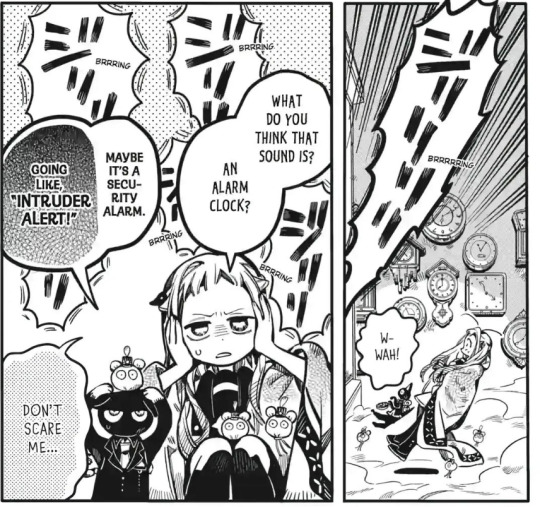
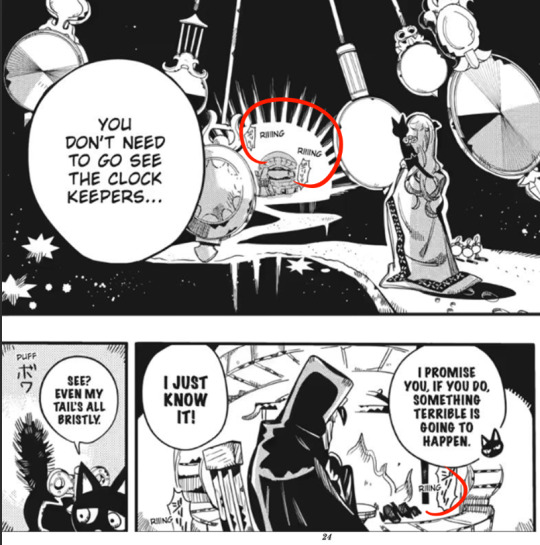
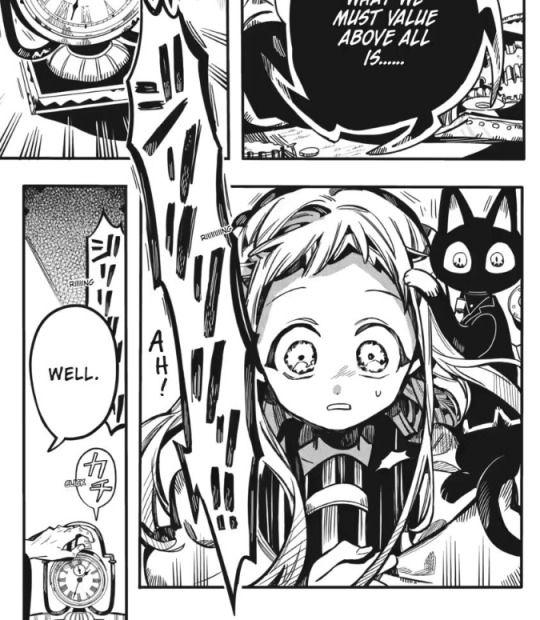
And we know that Nene doesn't have some privileges which only exist for the clock keepers.

I think it's possible that this new Akane has been trying to reach her since the first loop and that the alarm went off when he entered the boundary.
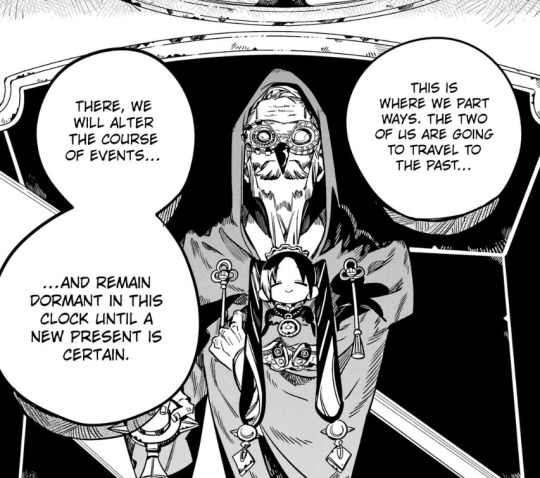
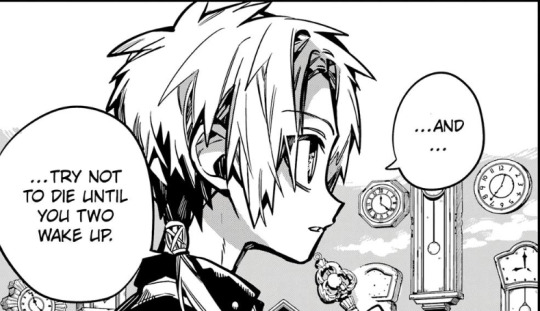
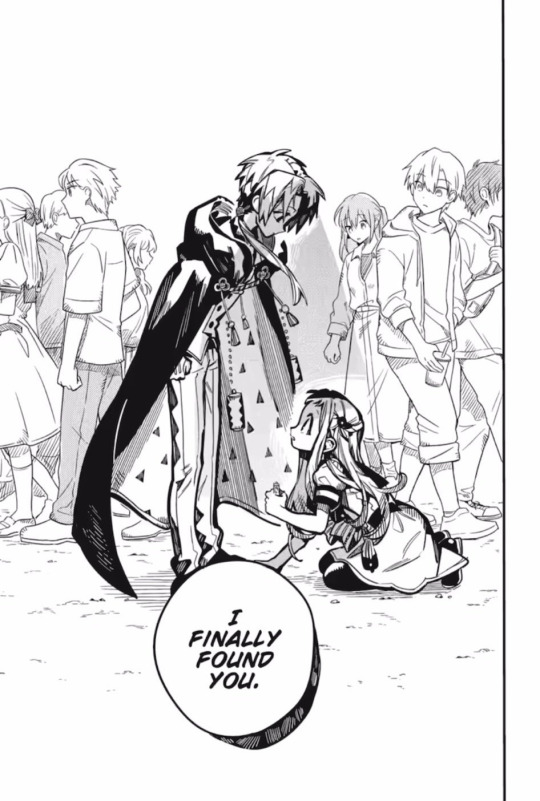

Which would also explain why Kako wasn't really bothered by Nene announcing that Akane was dead. Since the moral of his tale is that you shouldn't sacrifice your Present, what is in front of you, for a lost Past and/or an Unknown Future.

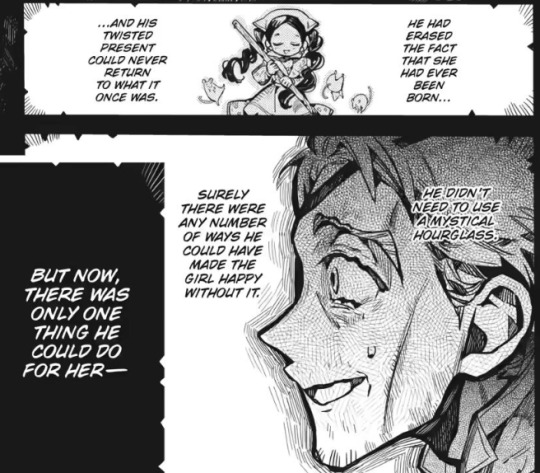
#tbhk#toilet bound hanako kun#jshk#aoi akane#the three clock keepers#this is really random but I've been thinking about this alarm since a long time#and my only guess on who that could have been was 'Akane but possessed' or 'Akane as the clock keeper' or 'Teru bc fck logic'#so welp#bc remember that the boundary isn't supposed to be easily reachable ahahahah#(Nene has the cat <-- I try to persuade myself ahahah)#jshk spoilers#tbhk spoilers#this is ful bullsht tbh but that's why it's fun to say#I still think that Kako's story is more a 'cautionary tale' and not the full truth for now#but the idea is still here#which was why I was really?????#about him not giving a fck about Akane when the moral of his story is that the present is also important#this is a little thing that will be repeated in the bix thing I will do about the present and Akane ahah#yashiro nene#hanako kun#mirai tbhk#tbhk analysis#Kako tbhk#Mirai tbhk
114 notes
·
View notes
Text
I think Dazai's backstory is really cool in how, despite having more information about it than most other characters, majority of his life is just one giant noodle incident.
Yep, that's the line I'm going with as an introduction to this analysis. Just bear with me.
To start off, for those who don't know, the term "noodle incident" originates from the (amazing) comic Calvin and Hobbes. In it, the whole idea is that Calvin did this unspecified thing in school that involved noodles, but it's never confirmed what exactly happened. It's only referenced in passing, and it is clear that it was not good. Applied to general fiction, the term Noodle Incident refers to an event that is often referenced, but never clearly explained, and what is important is the characters' reactions and feelings towards it. The principle idea behind it is that imagining what said incident could be is way more significant and impactful than anything it would actually be if it was said. It's not the event that's important, but the effects and responses to it are. *for more info, I recommend Overly Sarcastic Productions trope talk video about it*
Now, how this plays into Dazai's life is that, while it is extremely evident that he likely has a horrible, tragic backstory, we never really get to see much of it. The earliest we are introduced to him, he is already suicidal, and he has lost most in hope in existence. These feelings are tempered a bit when he first joins the Port Mafia, but they come back all too quickly. And while you could argue that him being in the Mafia is a large contributor to his depression,the main reasons why he seeks escape clearly transpired before he ever met Mori.

Dazai was already trying to commit suicide at fourteen, which is how he met Mori. Something happened earlier in his life, but we don't know what. Asagiri himself says that he left Dazai's core, the reason he wants to die, vague on purpose. We aren't given many details, and honestly, we aren't given much backstory to it either. The two biggest hints that we get is when he is speaking to Odasaku. First in The Day I Picked Up Dazai, and the second from Dazai and the Dark Era.
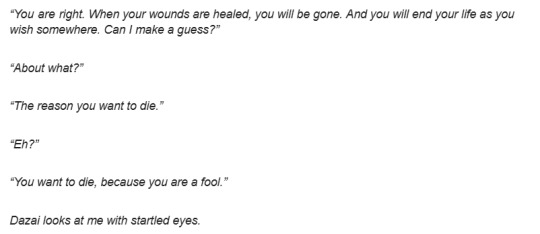
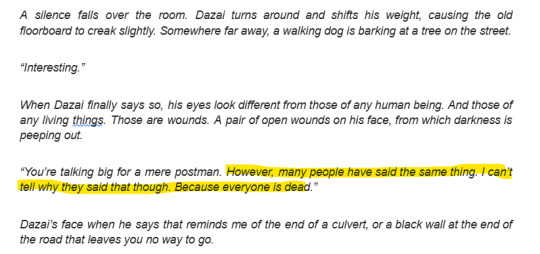

We have no idea who or what Dazai is referring to. From all that we have seen, all the backstories and light novels we are given, the only people that we know of whom Dazai actually lost were Ango and Odasaku-for Ango, it was that special friendship, and Odasaku, it was his life. And even so, it isn't much of an explanation, because he was obviously suicidal before he met them, as evident from how he speaks to Odasaku, and losing them wasn't a catalyst for Dazai's depression. (As a matter of fact, it was actually the first step towards improvement, but that's a different analysis).
Yet for how much we don't know about Dazai's life, I think it's done in such a way that it doesn't really matter. It's a noodle incident, in that sense. Because it's not about the events that actually transpired, it's about how that affects Dazai and the way we see him. Don't get me wrong, I would love a full, confirmed backstory, but Asagiri doesn't seem to intend to write it, and that makes Dazai's character so beautiful. It's also one of the reasons why the dark era, especially the light novel, is so tragic. Because yes, you can argue that as far as tragic backstories go, losing two friends isn't near the most awful, especially not in this universe (I'm not trying to play the "which character has more trauma" game, but compared to, for example, growing up in an abusive orphanage, it's relatively not as inherently tragic. That doesn't make it any less horrible though). But the point of the backstory isn't just to explain the reasoning why things ended up the way they did, why Dazai left the Mafia, boo hoo his friend died, but Odasaku and Ango represent everything in Dazai's life, everyone from his past we never got to meet and I'm not sure if we're ever going to. They symbolize all the things in his life that mattered to him, everything he never wanted to lose but did. The last scene in the bar, where the three of them meet up for the last time, Ango leaves, the picture with the three of them laughing and smiling, the whole thing is meant to serve as a microcosm for Dazai's life as a whole. That he feels he's always going to lose everything, and that's why he wants to die. We don't get details, we don't know the specific events, but we're left with the emotions that gives us an important glimpse into this character's mind, more than his life, and that's what makes him such an interesting character that's left open to interpretation and analysis. We aren't privy to the tragedy, but the aftereffects of it. And, almost as if to prove the point, Odasaku dies the next day. Right after Dazai says he always loses everyone, further cementing the idea that there's almost a curse surrounding him, a void of loneliness that may never be fulfilled, which is as much as Odasaku tells him when he dies.
Whatever happened in Dazai's life before fourteen was probably something horrible and tragic. Maybe he had a family. Maybe he had other good friends. Perhaps he even believed in the goodness of life and humanity. But what's really cool about the way he's written is that the exact events are not important nor necessary to understanding his character. His life is one big noodle incident, yet because of that, we're able to glean an almost deeper understanding about him, by leaving the details in the dark and exposing only the raw, humane emotions left behind. The most important part about any backstory in fiction isn't about what actually happened, it's about how does this affect the character now? What lasting impact did it leave on them, and how is it evident in the way they interact with the story in the present? This is something that Asagiri nails on the head when it comes to his backstories. And I think the lack of clear information about Dazai's backstory, yet all the information we do end up getting about him, is one of the reasons why Dazai is such an interesting and intriguing character in the series.
Thank you all for you time. You may now return to your procrastination.
#Yeah I've got tons of work to do today#so I naturally wasted time writing an analysis instead#that logic checks out#anyways#I really like Dazai#I think he's a really cool character#misunderstood as he is#we have so many light novels about him and he's still so mysterious#this was just something that occured to me reading the day I picked up dazai#bungou stray dogs#bungo stray dogs#bsd#bsd dazai#bsd analysis#bsd dazai analysis#the day I picked up dazai#dark era dazai#dark era bsd
157 notes
·
View notes
Text

milgram analysis: how mikoto introjects and conforms himself to social misconceptions around DID
analysing mikoto's character, how Milgram frames DID to characters and audience, and following how mikoto's sense of self and presentation develops in response to Milgram and the DID label.
(google docs ver for ease of reading)
will be referring to milgram-en's (John Doe, Neoplasm, interrogation) and Maristelina's (timeline) translations. thank you for your work!
note on content: i am die-hard autistic about DID representation.
as of writing this essay, i've already written two long analytical essays criticising mikoto's reception, and sharing my (strong) opinions on how i believe his DID functions.
while it's not necessary to have read my previous essays to understand this one, if you would like to understand my take on him in more depth, or just read more of my criticism around DID representation, you can find links to them here on my website!
note on names: for the purposes of this post:
mikoto refers to the person/system, all parts included
'mikoto' refers to any normative part of mikoto, when intentionally distinguished (ie. when the idea of mikoto having a 'normal' self is evoked and spoken of in opposition to an 'other' self)
mikoto (俺) refers to the 'othered' mikoto that appears in the John Doe (Trial 1) voice drama and attacks es. it also refers to the 'othered' mikoto from the timeline conversations, as that is the pronoun used, although these are not necessarily 'the same alter'.
mikoto (オレ) refers to the 'othered' mikoto that appears in the Neoplasm (Trial 2) voice drama and claims to be the alter who commit murder.
please note that i use words such as 'unacceptable' 'intolerable' etc. a lot in my mikoto analyses. please note i don't use these words in an 'objective' or judgemental way. i will always mean it first and foremost that whatever i am referring to 'cannot be accepted/tolerated by mikoto/the world he comes from'.
i'm working with translations and 09 is a complicated character, so please forgive any slip ups!
thank you for reading.

introduction: why do social misconceptions matter?
in my experience, a lot of discussions about mikoto are dominated by the fact that he has DID.
more specifically, i find that a lot of discussions around mikoto are dominated by the impression that his dissociative disorder indicates that 'plurality' or 'systemhood' is his inherent state of being. i find many people believe that having DID makes you 'a system' of discrete parts / alters / personalities, while others who do not suffer from DID, are not. therefore, the reveal of mikoto's DID is the reveal that mikoto is not one identity, but instead a 'system' of multiple alters that are yet to be defined and discovered.
this way of understanding mikoto leads many to interpret es', jackalope's, and kotoko's labelling of mikoto with DID as a generally neutral act — or even a positive one.

while mikoto, for the most part, is not aware of his DID, and being forced to be aware of his symptoms may be destabilising, because it is a 'fact' he has DID, this label being applied to him would seem to ultimately be an act that brings us closer to understanding mikoto and the truth that lies within him. it would seem that by reaching this label, adapting how we see him according to it, and subsequently communicating with mikoto's alters as individuals, all es does through their labelling of mikoto with DID is 'uncover' a 'truth' about mikoto and act accordingly, as one should.
in my opinion, having preconceptions about how one's self operates and would benefit from being treated, just because their symptoms correspond to a diagnostic label, is misguided and dehumanising to the mentally ill. more specifically to mikoto, i think these preconceptions have completely overridden any potential discussion about his themes, character influences, and the commentary on power dynamics, toxic social expectations, and coercive self-identification that Milgram provides.
mikoto is not just a character that suffers from the symptoms of DID. mikoto is, also, a highly socially conscious, adaptable, and vulnerable character, that is an expert at gleaning the expectations placed on him by those in power and authority, and conforming to them, to spare himself from scrutiny and abuse.
i believe mikoto's relationship to the label of DID and his 'systemhood' is less so about indicating his inherent state of being, and moreso a tool he adopts due to the social position he is placed in during Milgram, that he uses for his survival, and introjects to protect his self-image.
or: i believe mikoto actively responds to the label of DID as it is applied to him, gleans the social expectations of the label, and acts accordingly, introjecting a 'multiple' way of seeing his self as a way to make sense of his inner turmoil, and also plays the cards he is dealt socially, taking advantage of the audience's preconceptions around those with DID to help him survive the institution of Milgram and escape its torture and punishment for the murders he commit.
enjoy the read. i have a lot to cover.
main body 1: culture and conformity (quick section)
let's first put him into context.
being a person that suffers from a mental illness changes how you engage with the world.
not does being mentally ill mean you are considered to be atypical in how you view and interact with the world, with that difference causing impaired functioning and disruption to your health, but being mentally ill also impacts how others and wider society treat and value you, and subsequently how you treat, see, and value yourself.
in many societies, including japanese, having mental illness is a source of shame. because being considered mentally ill - having impaired functioning - involves the inability to fulfil an expected societal role or conform to societal and social expectations, being labelled as and functionally mentally ill often reaps the consequence of being unable to fit into society: being ostracised, being deemed an 'other', a worthless human, and/or a threat.
under the threat of ostracisation from their societies, and in the avoidance of shame, many people, such as mikoto, value their social roles, and have strong ideas about how they 'should' act and how they 'should' progress through life. should they struggle with their mental health, or otherwise feel that they are not acting or existing as they 'should', many will do anything in their power to maintain the illusion of functioning and normalcy, sacrificing their wellbeing in private and repressing any parts of themselves that they deem socially unacceptable.

mikoto, on practically every level in his life outside of Milgram, is not in a position to engage with the notion of being nonconformist. there is too much at stake for him, in his livelihood, his social position, his familial responsibilities, and his self-image.
it has been, and continues to be, vital for mikoto's survival that he stick to his established social role and conform to any social expectations placed on him, even if it causes him harm, because by aligning himself with the expectations of those with power over him, he can expect those in power and authority to favour (or overlook) him, helping him avoid scrutiny, shame, and the loss of everything he has sacrificed for.
this approach to navigating the world is ingrained in mikoto, and brings us the mikoto we encounter in Milgram.
main body 2: mikoto and social expectations
milgram.jp/character/mikoto (Profile): 常識人なりに常に状況に対して順応しようとしている。 tl: "A sensible* person who is always trying to [adapt/conform/acclimate/accomodate] to whatever the situation is." By "sensible", it means acting in accordance with prudence and propriety with the mores. (@milgram-en)

mikoto is first introduced to us by emphasising how 'normal', average, and "sensible*" he is, and the fact he is a man that is "always trying to [adapt/conform/etc.]" to the situation at hand, conveying how attuned and aligned he is to social expectations. he also describes himself along these lines, emphasising his desire to be seen as a conformist and socially acceptable individual.
outside of the impression of normalcy he intentionally gives us, it is also likely that mikoto genuinely sees himself in this way, due to his own avoidance and a psychological need to protect his sense of self. (I speak in this essay about mikoto's relationship to shame.)

mikoto's desire to be seen and see himself as socially acceptable extends to a pathological degree; he displays a severe disconnect from unacceptable parts of his identity (such as his ever being angry before) that instead manifest in his dissociative parts,
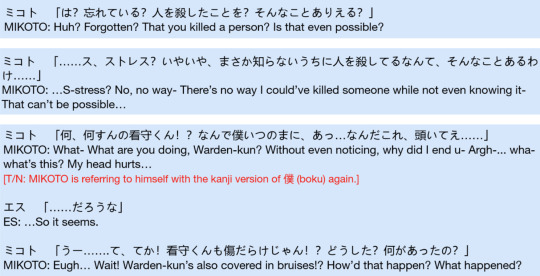
he appears to / acts as if he has have no memory of his murder, and violent outbursts,

my friend pointed out that the dream imagery in MeMe and Double may be suggestive of his derealisation (it may imply he does have memory of his murders, but it feel so unreal and foreign to him that he can only feel that it must have been a bad dream he had),

and when pushed on the matter that he may be a murderer and have just forgotten, he has a panic attack, and his normative parts are forced to switch out and disengage, ensuring his dissociation from everything unacceptable about him, including the fact that he is a murderer, remains intact.
these traits mikoto has early on in Milgram are indicative of the person he has developed to be as a result of his upbringing and sociocultural influences. his social expectations outside of Milgram, to name a few, are to be operational, obedient to authority, and to conform. he cannot be, and therefore 'is not', strange, abrasive, mentally ill, or a murderer.

however, Milgram itself is a society in a sense, with its own social expectations, norms, and statuses. in John Doe, mikoto's insistence on his normalcy is rejected, due to being incongruent with the reality of Milgram, that denotes that he is a murderer. es attempts to force mikoto to acknowledge the reality of Milgram, and although he shuts down, dissociates, and ends up physically retaliating to es’ attack, mikoto's resistance to the label of murderer is a losing battle, and he knows it.
milgram.jp/character/mikoto (Profile): 夜中になってもミコトの監獄からは物音がするため、いつ寝ているのかがわからないと囚人の間で話題。 tl: "There are noises coming from Mikoto's prison even in the middle of the night, and the prisoners say they have no idea when he is asleep."
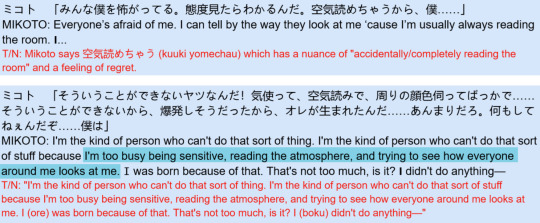
moreover, mikoto is attuned to the rising realisation that something is not right, and that others are becoming concerned about and afraid of him.
since the negative reputation mikoto gains in Milgram amongst his fellow prisoners would seem to be about the seemingly aggressive actions of his other parts (such as breaking things in his room while having meltdowns, defending himself against kotoko, and being judged unforgiven in Trial 1 following his (俺) violent outburst), mikoto likely feels he is not able to smooth this negative reputation over with his typical normative and friendly demeanours alone, and likely feels very out of control of his circumstances, reputation, and self overall.
all of these indicate to mikoto that he is in a new, strange place, removed from his ordinary life, with a new authority (the word of the warden) to conform and appeal to, lest he ostracised, punished, scrutinised, and have his sense of self shattered.
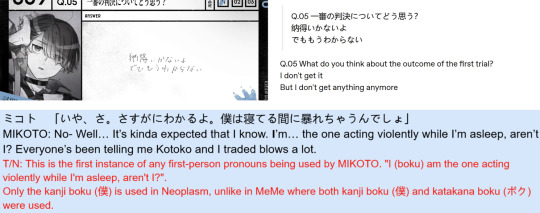
and interestingly, while he persists in being unable to integrate with his sense of self the idea that he is a murderer or commit violent acts, at the very end of John Doe he is bestowed a diagnostic label, that is then proposed to and adopted by Milgram's figure of authority. this label he finds applied to him is one that carries a preconceived notion around his personhood, and may just free him from having to shatter his forced-normal view of himself in light of his murders and acts he cannot explain, and instead allow him to blame everything unexplainable about him on an ‘other’ within himself.
main body 3: mikoto and the label of DID

at the end of John Doe, and following mikoto's (俺) violent outburst at es' prodding, kotoko armchair diagnoses mikoto with DID.
(at the beginning of Trial 2, Milgram (through jackalope) would seem to have confirmed this to be an accurate assessment, but in my opinion that's neither here nor there; just because he 'has' a disorder, does not make him an expert in it, necessarily honest about his symptoms, or immune to playing up his presentation to fit how people expect him to act or because of outside influences that coerce how he conceptualises himself in light of the label.)
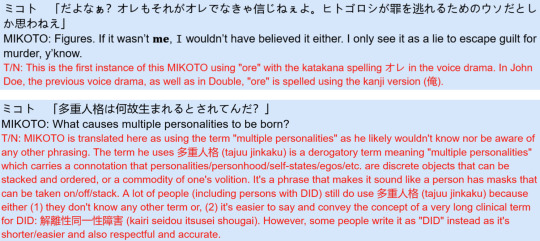
when understanding what this act of labelling could mean to him, it's important to establish that, up to the beginning of Neoplasm, mikoto himself seems to a) not be aware that this is a condition he suffers from, and b) only really have a surface level knowledge of what DID is. he asks es about basic functions of and theory around the condition, and even confesses that in es' shoes, he would have assumed someone claiming to have DID was a liar trying to dodge responsibility.
that is to say, from the moment he realises this is a label being applied to him, the only real information he has about what this label means and what his social position is now is lifted directly from what es tells him, and what we, as the audience (that he hears as 'voices' between Trial 1 and 2) apply to him. which is great for me. what a controlled environment to analyse.

in my opinion, the earliest point that mikoto may have realised the DID label / model was being applied to him, is at the end of John Doe. even implicitly, es introduces to mikoto the concept of there being 'another him' or some 'outside' force within him.

even earlier than that, kotoko very powerfully controls the audience's eventual discourse around how we should be thinking about him in light of the diagnosis. by directly tying the label of DID she applies to him to an abstracted debate about culpability in patients with DID, the status of 'person with DID' mikoto gains fundamentally becomes a question of if he should be 'let off' for his actions because of it. therefore, Milgram ensures that a leading debate when it comes to mikoto and his diagnosis is the possibility of being forgiven because it was not 'actually him' that commit those acts.
(i'm not sure where to fit this, but i do want to comment on the violence of applying this stigmatised diagnosis to him so carelessly and without his consent, and especially encouraging es to see him accordingly as a 'case' of DID ('real multiple personality disorder patient'), thus dehumanising him by transforming him into an abstract thought experiment. i personally think it's abusive and prejudiced to act like his personhood and manner of existing is for an authority to 'other' and define; despite his dissociation, mikoto does not express a desire to be seen as multiple alters until it becomes strategically useful, and i genuinely believe that applying the label of DID, and thus the model of 'systemhood'/'multiplicity' onto him, without his consent, is abusive and prejudiced. i believe any person's decision to see and express themselves as a 'system' of multiple selves must be done on their own accord and for their own benefit, and not because they are pathologised and somehow deemed inherently 'different' as a human being. ok, i just wanted to say this.)
all this to say, between Trial 1 and Trial 2, at the same time that mikoto is coping with and trying to make sense of this traumatic and strange situation, feeling out of control of his circumstances, reputation, and self, he is persistently hearing the audience discuss the notion that there could be 'another him' responsible for all his intolerable acts, behaviours, and personality traits, as well as the idea that this 'other him' is also 'not him', and that it is a possibility they may not hold mikoto responsible for the actions and existence of the 'other him'.
it has been, and continues to be, vital for mikoto's survival that he [...] conform to any social expectations placed on him, even if it causes him harm, because by aligning himself with the expectations of those with power over him, he can expect those in power and authority to favour (or overlook) him, helping him avoid scrutiny, shame, and the loss of everything he has sacrificed for.
as i've established, mikoto has a narrowed self-image; he is avoidant to acknowledging distress and possesses a psychological need to protect his sense of self and appear normative, functional, and socially acceptable, which he does by disowning parts of himself and dissociating.
not only is it helpful for him to play the cards he's dealt and adapt to the position he has found himself in to curry the favour of those in power (because frankly, weakly and confusedly resisting es' assertions of his identity as a murderer due to his normative parts' narrowed sense of self is draining and triggering to him, and getting him nowhere in terms of Milgram), but i cannot emphasise enough how subconsciously appealing of an explanation it must be to him, to imagine that everything he has psychologically disowned actually 'isn't him', and therefore an aspect of his self he does not have to face responsibility or consequences for.
that is to say, although he truly suffers from DID and has truly dissociated from parts of his self so much that he cannot and refuses to recognise them as himself, because kotoko evokes the common and 'othering' misconception that alters are discrete and autonomous (and opens the debate about the possibility of not holding one responsible for the acts of the other), the audience's debate encourages mikoto to adopt the belief, outlook, and strategy that his alters are 'different people', distinct from him, and solely responsible for the acts mikoto has dissociated himself from.
main body 4: introjected stigma and self-conceptualisation
while i think on a lot of levels, mikoto conforms to the DID status as a tool for his Trial 2 interrogation, it is still worth noting that as a vulnerable person with a socially reliant sense of self, mikoto is vulnerable to introjecting stigma and negative conceptions around the mentally ill, and applying them to himself, which negatively impacts on his self-image.
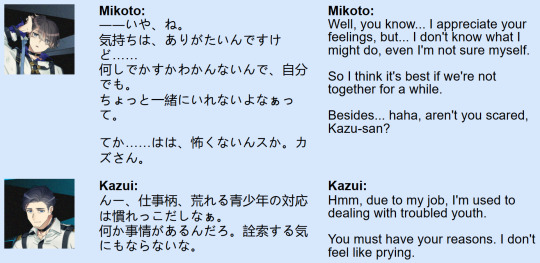
date: August 5th, 2024 (Kazui's Birthday)
even without es' authority to perform a certain identity towards and appeal to, as Milgram progresses, mikoto appears to slowly grow to worry about himself and genuinely start to believe he is unpredictable and violent, thus seeking to isolate himself from others. he also demonstrates the assumption that kazui is in touch with the social consensus that there is something scary or strange about mikoto, and expects kazui to treat him and think about him accordingly.
AMANE: ...Who are you? How intriguing. Are you saying you are not Mikoto Kayano? MIKOTO: Ha- You're asking who am "I"? That's what "I" wanna know. Whoops, don't come any closer. I'm in a rebellious phase and there's no guarantee I won't kill you, brat [kid] or not. Just leave quietly.
date: October 6th, 2024 (Mikoto's Birthday) (source)
mikoto, later, also directly engages with the social consensus that there is something strange and scary about him. during his birthday interaction, mikoto (俺, it would seem, or at the least an 'other mikoto' that uses this personal pronoun, given that's what's written) actively portrays himself to amane as 'not mikoto' — a violent and unpredictable undefined existence, that people should stay away from, and reinforcing his established negative social perception.
this is in line with mikoto's growing internalised belief that, due to his (or, in having) mental illness, he is violent and unpredictable.
as ore (俺)/'not mikoto' he is also able to engage directly with this introjected belief, and actively portray himself according to how he believes others see him, to reinforce that status for his goals. for this circumstance, his goal appears to be - again - to isolate himself, because he believes that there is something wrong with him, and believes that he may become violent for no reason, something he does not want to have happen. thus he threatens amane, reminding her of his poor reputation, and 'protects' her from himself.
(note: i am calling his belief that 'he is volatile' an introjected belief, and not entertaining the idea that he is just being honest about his own violent impulses, because despite his negative reputation, mikoto (regardless of self-state) has never demonstrated that he is someone who becomes violent 'for no reason'. in my opinion, by warning amane to stay away for her own safety, he demonstrates that he does not want to hurt her. moreover, the only fights he has engaged with were explicitly in self-defense: kotoko in physical self-defense (although is unaware of this context and attributes it to sleepwalking, furthering his belief he gets into violent situations without his control and unprovoked), and es in psychological self-defense, only after being pushed far further beyond his mental limits than any other prisoner.)
another goal in this interaction with amane could also be, in my opinion, the desire to protect himself through self-isolation. because mikoto is vulnerable to social scrutiny and shame, and feels as if he can't control his acts or how he is seen, it would make sense that he therefore strives not to be seen by or interact with anybody, allowing him to maintain at least some amount of control over his identity and the way he is seen. thus, just like his interaction with kazui, mikoto (俺) plays the cards he has been dealt to his advantage, and reminds others of his negative social perception, to secure a relative social safety in being isolated.
i also think it's worth commenting on the dimension of mikoto (俺) in this interaction being 'not mikoto', and the psychological and social advantages of playing into a sense of DID/multiplicity. i think a major aspect for how mikoto internalises the DID label and sense of an 'other mikoto', is because by cementing a 'not mikoto', it helps mikoto remove himself from himself, and apply (which i typically call scapegoating) his undesirable traits onto an 'other'.
when it comes to mikoto's (俺) warning to amane while he emulates the outcasted and rough social role he perceives as having, framing himself as 'not mikoto' allows him to act in the way he does to protect himself & others, without challenging his strong sense of what 'is' mikoto (ie. socially conscious, innocent of wrongdoing, conformist, sensitive). thus, mikoto (俺) does what he needs to do, and by psychologically removing his self from the act, protects his sense of self and preserves - at least to him - the illusion of normative 'mikoto'.
moreover, it is likely his (俺) sense of being 'not mikoto' is also a genuine dissociative feeling he has. because 'mikoto' is a narrowed identity that has disowned the majority of his own personality and humanity, and the traits and manners of existing contained in the 'other mikotos' are disallowed from being 'mikoto', it does beg the question to every other part of him of who they 'are'.
in my experience, drawing attention to (or god forbid, reinforcing) identity alteration/confusion makes it worse. therefore, i can believe that while in previous dissociative episodes mikoto has similarly felt 'altered' and 'not like himself', without the social pressure of Milgram and a preoccupation with the notion of having other selves (instead being preoccupied with his conformist identity and life responsibilities), he did not dwell on it, and quickly lost connection entirely with the instance in which he felt strange (either through estrangement and brushing it off, or forgetting it altogether).
in contrast, because in Milgram, DID and mikoto's strangeness is made to be at the forefront of his mind, the dysphoria inducing differences between what he thinks 'he' is like and what he is actually like become amplified. mikoto has likely become more alert to his idea of his 'self' and his manners of existing, leading him to more easily feel strange and 'out-of-character' for minor ways in which he does not conform to his narrowed sense of self, which leads his ostracised parts to properly notice and be affected by their exclusion from mikoto's accepted sense of self. thus, they perceive themselves — and begin expressing themselves — as unexplainable, disowned, existences.
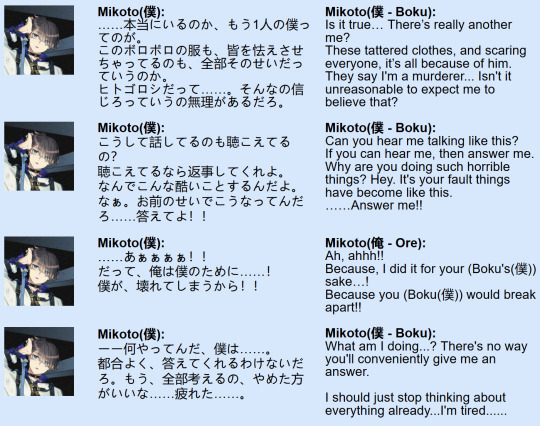
date: October 6th, 2023 (Mikoto's Birthday)
mikoto also directly confronts the idea that there is 'another him' during his 2023 birthday timeline conversation, and we even get to see two sides of him express the way they conceptualise themselves in opposition to one another.
i think this exchange really demonstrates how mikoto uses a sense of multiplicity to cope with his own shame and his fears around feeling out of control. by splitting the way he sees himself in two, mikoto can both blame 'himself' for his traumas and social ostracisation, expressing his internalised shame and self hatred, while also preserving 'himself' as an innocent victim and externalising his grief.
the beginning of this interaction is, explicitly, because mikoto 'comes around' to the model of multiplicity people have forcibly applied to him. with it in mind, 'mikoto' makes sense of everything that has caused him grief and blames it on the 'other him'.
specifically:
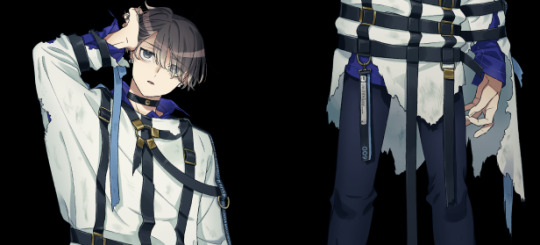
1. 'mikoto' blames the 'other him' for ripping his clothes: specifically, he blames the 'other him' for ripping his straitjacket he wears into t2 that, we can infer from the shreds, had incredibly long sleeves and bodice, and was likely used to restrict his movement and possibly restrain him.
therefore, while 'mikoto' blames the 'other him' for for the frightening state of his clothes, in context, mikoto's act to tear his clothes was one of resisting oppression. it was probably also an act of expressing more than a little rage at the injustice mikoto is facing in being incarcerated and abused.
'mikoto' does not acknowledge or sympathise with this context, and whether 'mikoto' is psychologically aware of this context to the 'other his' actions is unclear. it is possible his distress about his ripped clothes, and why he lashes out at the 'other him' for doing that, is because he is so dissociated that he is genuinely unaware of why he did this, and is frightened by the unexplainable and feeling out of control.
i think it's also possible that even if mikoto was aware of why he ripped up his straitjacket, he would not have sympathised with his past decision, and would still have verbally abused himself for acting out of line. because ripping the straitjacket is an act of resisting oppression — not conforming to his social position and submitting to authority — 'mikoto' likely finds it an unacceptable and dysphoric act. moreover, because ripping the straitjacket is more than likely an expression of rage, an emotion 'mikoto' does not allow him to express as 'himself' (and likely feels he has no experience with, as 'himself'), this goes doubly.
2. 'mikoto' also blames the 'other him' for scaring the others in the prison. i will assume this is referring to the loud noises he makes at night, the destruction of his property he does when angry, and the fight he gets into with kotoko.
(this timeline conversation takes place before the previous two i analysed, so i'll assume he hasn't began performing his 'othered' identity yet, in frightening others to protect them/himself. although, i have already covered why i believe he does this, and it's hardly malicious, so it wouldn't effect things either way.)
while it's understandable why mikoto and his fellow prisoners find mikoto's nightly crash-outs to be extreme, it's worth bearing in mind that not only is he having his rights abused, in a traumatic and triggering situation, and the only property he destroys is his own and in his own room, with no risk of anyone being caught in the cross-fire, mikoto does not have — and has never had — any healthy coping mechanisms for his anger outside of repression.
it is likely mikoto has no idea how to deal with overwhelming emotions, which not only makes them feel bigger and compound over his lifetime (as all he does is repress them, put them into a box for later, and act as if they do not exist), but also means that any time he does express them, it's not exactly in socially acceptable ways.
regarding his fight with kotoko, she explicitly attacks him first, and it seems it was only because he was 'ready' that he was able to hold his own and not be knocked unconscious (or worse, if you look at how mahiru ended up at her hands) like he was in John Doe. i think it's fair to say that any negative reputation mikoto receives for this scuffle is unfair, as is blaming an 'other mikoto' for 'scaring people' through it.
(it's also possible mikoto only perceives that people are scared of him because of his scuffle with kotoko, because he is projecting his own anxiety. it's entirely possible people are only scared of him because of the strange noises coming from his room, and his increasingly haggard demeanours, odd behaviour, self-isolation, and the fact they knew kotoko made an attempt on their life simply worries them, in a way they do not know how to approach. regardless of the reality though, he thinks others are scared of him, and punishes himself accordingly.)
thus, once again, 'mikoto' finds his — absolutely understandable, and often justifiable — expressions of anger and engagement in violence either unexplainable and frightening, or dysphoric and unacceptable, leading him to lash out to the 'other him' that he dissociates from, and that he associates with these acts.
'mikoto' also blames himself and his expressions of unacceptable emotions and behaviour for the abuse he is currently suffering within Milgram ("it's your fault things have become like this"). this is consistent with how mikoto has been conditioned throughout his life through his culture, to perceive any punishment, scrutiny, and inability to survive an unjust system as a flaw from within himself.
(this outlook also functions as a coping mechanism: by always finding the blame in himself, mikoto helps himself feel that he has control — believing that if he just does everything right, everything will turn out ok — saving him from the despair of acknowledging that social systems are often unfair, and pointlessly cruel.)
'mikoto' eventually receives a reply to his self-blame and verbal abuse after he begins to shout, with his 'other self' (who writes his personal pronoun as 俺 for this exchange) defending his actions (or the actions he identifies as having done) on the basis that he did it for 'mikoto'.
notably, mikoto (俺) never protests being blamed in itself, demonstrating that even in the parts of him that can stomach identifying with his deemed unacceptable acts and expressions, he universally lacks the self esteem to defend himself or consider it an injustice to be shamed. he also likely doesn't protest being blamed because the scapegoating of an 'other mikoto' is a source of stability for mikoto that allows normative 'mikoto' to be preserved, and thus is not a notion mikoto is willing to challenge; even if this had been a part that was willing to protest injustice, he cannot conceptualise doing so at normative 'mikoto's' expense, and also possibly cannot perceive injustice if it is at normative 'mikoto's' hands.
the interaction ends with 'mikoto' seeming to not hear mikoto's (俺) defense, and instead opting to stop thinking about this all. i personally read this as normative 'mikoto' being physically unable to process mikoto's (俺) response and dissociating very severely upon receiving one, demonstrating that normative 'mikoto', unlike his other selves, cannot directly behold his 'other selves' and parts, as they are so threatening to normative 'mikoto's' self-image and enforced illusion of normalcy that characterises this part of him. therefore, it is likely that the maximum extent to how normative 'mikoto' can engage with the notion of DID / having other selves at this point, is, at best, to engage with them as an abstract concept and 'other', for the sole purpose of psychologically scapegoating.
to conclude this section, i have demonstrated that:
as a result of the rising sense that something is 'not right' with him, social sensitivity to his negative reputation, and the concept introduced to mikoto of there being 'another him' who could be held uniquely responsible for perpetrating his unforgivable acts, mikoto begins to psychologically split himself apart. he finds that he can only tolerate the reality of his situation so far, and although he is 'aware' that others are afraid of him and that he has done certain frightening things, due to his narrowed normative self-image that he has cultivated to maintain his own acceptability and an illusion of control over himself, he finds himself drawn to the explanation of there being an 'other him'. from there, mikoto scapegoats all his intolerable acts and traits onto this unexplainable, abstract figure, who he feels — expressing his own intolerance towards himself — deserves to be shamed, blamed, and needs to stop doing the 'awful things' he does immediately.
in response to his new split self-perception and his preexisting complexes and weak sense of self, mikoto begins to consider himself an 'other mikoto' or 'not mikoto' whenever he finds himself in a self-state that acts or operates beyond his normative, tolerable, persona. as these newly mentally defined parts, he encourages his own psychological splitting and scapegoating, and comes to shoulder unique responsibility for his intolerable acts as his 'other selves', allowing him to maintain the security and purity of his normative persona, despite how Milgram persistently forces him to engage with an intolerable reality that would challenge it. due to natural differences between normative 'mikoto' and his 'beyond normative' self-states in what they can tolerate and engage with, mikoto (in his 'other' states) also finds himself interacting with his perceived negative social reputation, and occasionally leans into an 'othered' persona, portraying himself how he believes others see him (and how he has come to believe he 'is') — shameful, uncouth, and at risk of becoming dangerous, unprovoked — to protect himself, and others, from himself.
in this way, social stigma around mental illness, mikoto's poor relationship to himself, and the label of DID that Milgram introduces to him (the notion of there being an 'other him') drastically changes how mikoto conceptualises himself, and shapes to a massive extent how he comes to cope with Milgram — a new, traumatic and stressful society that he has found himself in.
main body 5: DID as a social tool
as established in section 3, the label of DID when applied to mikoto is fundamentally a thought experiment posed towards the audience about the culpability of persons with DID. as explored in section 4, due to the audience's suggestions and his own complexes, mikoto has begun psychologically dividing himself from the acceptable (innocent of wrongdoing) parts and unacceptable (associated with wrongdoing) parts.
while, as mentioned in section 4, normative 'mikoto' seems unable to directly behold his 'other selves', and can only briefly entertain the thought as an abstract concept before shutting down — mikoto's 'other selves', already on the exiles of his identity, have no such phobia of the intolerable or enforced normalcy to sustain. thus, in the pursuit of appealing to abusive authorities that dictate their treatment and survival, they can directly engage with, and negotiate according to, the model of DID and multiplicity that has been applied to them.
in Neoplasm, mikoto (オレ) engages directly with the notion of there being an 'other mikoto', in order to scapegoat this ‘other self’ for mikoto's crimes. this not only allows himself to protect himself psychologically, preserving the illusion of normalcy and innocence for normative 'mikoto', and encourages Milgram to cease attacking his sense of self (instead bringing all the heat to the 'other him'), but is also vital for making the most out of the model es has applied to them, and allows it to be framed it in a way that secures a forgiven verdict for himself, ensuring his physical safety and, hopefully, leading to his ultimate survival and freedom from Milgram.

in contrast to John Doe, wherein mikoto is psychologically removed from his normative state when put under immense emotional pressure, but never identifies himself as 'not mikoto', in Neoplasm, mikoto (オレ) makes a point to draw attention to his shift in his sense of self. he does this by responding to es' comment on ‘his’ ‘sudden appearance’ roughly, openly reacting to es as if he's only just laid eyes on them in a while, and immediately, suddenly, alluding to the events of the 'other mikoto' in John Doe.
all these choices communicate to es that, and reinforce their perception that, mikoto is no longer 'himself'.

after a short period of mikoto (オレ) expressing his change in personality and attitude from his typical demeanour, es attempts to adapt to the situation according to how one may engage with a 'case of DID', and makes attempts to identify ‘who’ this self ‘is’.
in light of common preconceptions around DID, es demonstrates the assumption that mikoto's alter would have a unique name and personhood (or at the least, expresses the desire to assign mikoto's alter a name, as to distinguish him from 'actual/normal mikoto').
mikoto (オレ) reacts with surprise and suspicion that es is taking this turn of events so easily, demonstrating a consciousness about his social standing and the absurdity of the situation he has found himself in, and attempts to gauge how much es actually believes what is going on. i find this to be a good and socially-conscious first move — it would be incredibly embarrassing and ineffective to continue if the warden was only entertaining what they thought was a blatant lie.

despite mikoto (オレ) making a direct reference to malingered DID and its infamy in cases where people fake the condition to try and escape responsibility for murder, es' response assures mikoto (オレ) that, because they have decided he is an 'authentic case' according to jackalope's judgement and the consensus of the audience, it has never crossed their mind that he may still use its social status, the model of multiplicity, or misconceptions around the condition to his advantage.
which is a — relatively speaking — decent place for mikoto to confirm he is in; he has just confirmed that whether or not he 'has' DID or has an 'other self' is not up for argument, and can be assured that this is indeed the view of his self and expectation for his behaviour that has been placed upon him, that he must work with. he can be assured he is acting ‘correctly’, and continues with this approach.

despite the fact that mikoto (オレ) expresses no desire to be named anything unique (having already dodged the question once), and immediately complains about the name he is given, refusing to affirm it, es insists on naming mikoto (オレ) 'john'.
in the act of giving mikoto (オレ) a distinct name, es draws a binary in mikoto, and creates the illusion of discrete personhood between mikoto's alters, borne from their, and the audiences', rudimentary misconceptions around DID. moreover, as my friends have pointed out, by assigning him a western name, typically reserved for animals and (in being derived from 'John Doe') things that are 'unknown', es cements the sense that mikoto (オレ) is an 'other' — whether that be not japanese (not aligned with their cultural values, ideals, and society), not human (but an animal, pet, or beast), or dubiously existing or definable at all. this, again, opposes mikoto (オレ) with his normative, conformist identity, reinforcing mikoto's dissociative ostracisation, and the sense, for the audience, that mikoto exists as a binary 'system'.
mikoto (オレ) is not pleased about this development initially, due to, presumably, not actually having a particularly distinct sense of self as an alter, and probably feeling pretty insulted by the name choice. however, es' decision here to personify 'john' and crystallise the sense that the 'other mikoto' is his own distinct being who contrasts mikoto, later becomes vital for mikoto's (オレ) negotiations, and is also crucial for crystallising mikoto's reception as a 'system'. so, thanks, es. this is a surprise tool that will help us later.

during the interrogation, the first time mikoto (オレ) draws a direct parallel between ‘himself’ and his normative self when musing to es about how frequently he has found himself in his 'other' states, being unable to exist in his normative selves due to the psychological damage of Milgram (that accuses him of murder, seeks to restrain him, and has him finding himself doing unacceptable acts, such as lashing out against injustice). that is to say, the first time mikoto (オレ) reinforces and appeals to the binary between 'himself' and his normative selves is in framing 'his' continued existence as a threat to 'mikoto's'.
in my opinion, this conveys a genuine anxiety mikoto has, albeit through the lens of the illusion of having a binary self. mikoto, defined as he is to his established position in the outside world, wants to be his normative selves; he wants to maintain a sense of normalcy and live a safe and socially acceptable life, and he feels ashamed and monstrous when he acts out of line from that. i find it likely that mikoto genuinely finds it distressing that he has so often not 'been' or felt 'right' since the unforgiven verdict, and is afraid he may never be able to act as ‘himself’ (as he understands it) again, if Milgram persists.
i also think this anxiety also speaks to how moldable he is by Milgram’s environment: under the pressures of Milgram, mikoto’s ‘new self’ he is adjusting to, that is dictated by Milgram’s expectations and labels (of murderer, volatile, prisoner), is naturally becoming a more dominant force as he adjusts to his new social position. therefore, it is not just that he is dissociating, and discovering ways he feels he is out of line with his normative sense of self, but under these new labels and pressures, he is finding himself to be fundamentally shaped and changed by Milgram into a new self, not unlike how he was by the outside world. i find it likely that mikoto is also afraid of losing himself in becoming a product of Milgram’s environment, and in turn becoming alienated and ostracised from his culture, upbringing, and life from before the events of Milgram.

after asking es about a basic function of DID — what causes a dissociative separation between self-states — mikoto (オレ) ponders on why he (オレ) exists and has been himself (オレ) so often, and alludes to 'mikoto's' distress at being persecuted for crimes he does not remember, rationalising that this is why his normative self has not felt conscious lately.
i feel that the way in which he expresses his relationship to his crimes ("the person in question...") draws attention to the unique selfhood of 'mikoto-who-does-not-remember', and conveys it at a distance. this both reinforces the idea that normative 'mikoto's' self has nothing to do with his murderous acts, and that this self is estranged from the mikoto that is speaking.
(according to my friend, the incredibly objective way he speaks here almost makes him sound like a defense lawyer (or other third party) representing his client. this tone and framing of his selves helps mikoto create the illusion that ore's (オレ) assessment of his normative self can be trusted — it's generally a lot more convincing to say somebody else didn't do it than that 'you' didn't do it — and discourages es from interrogating (attacking) his normative self any further, as he has a reliable, compliant, and well-spoken 'representative')
in light of ore's (オレ) compliance and confident, seemingly trustworthy assessments of his normative self, es seems prepared to take mikoto's words as the truth.
(as to why es takes this explanation at face value, i think it’s important to analyse es’ and mikoto’s relationship and dynamic thus far.)
(in John Doe, the bulk of es' struggles engaging with mikoto as the warden can be attributed to that fact that es, as an agent of Milgram and authority in this circumstance, is shaped to the belief that Milgram is 'just' and does not make mistakes; es trusts that Milgram would not have brought in mikoto had he not commit murder, and uses this belief as the basis of their interrogation. however, mikoto is unable to face this fact, and clings, in opposition to es, in his belief in his normative reality and sense of self. therefore, during the bulk of John Doe, mikoto stubbornly resists es' worldview, and es — with the exception of briefly entertaining him — stubbornly resists his. both parties find themselves unable to reconcile the facts that they respectively trust in, and find themselves at a standstill and conflict. this ultimately leads the interrogation to not particularly develop in any useful way, and ends with es injured, after mikoto physically retaliates after being pushed and abused too far.)
(however, if we are prepared to believe mikoto has different autonomous selves, this would seem to provide a new, seemingly logical answer as to why mikoto has found himself admitted to Milgram, that mikoto can — more or less — allow himself to engage with and mold himself to. through the explanation that it was another of mikoto's selves, Milgram was not strictly 'wrong' that mikoto had commit murder, Milgram's integrity is preserved, and es has no reason to object on a fundamental level to mikoto’s assertions.)
(also, from es' perspective, ore's (オレ) compliance in Neoplasm, fitting into the role of ‘model prisoner’ (in that he is rough, appears to act the part of a violent prisoner, but also never really lashes out and is cooperative for discussion), is a real breath of fresh air. not only does the split-personality explanation work for them ideologically, and it also helps es avoid the stubborn, uncooperative, normative ‘mikoto’ that refused to engage and lashed out. therefore, in Neoplasm, mikoto (オレ) entirely conforms himself to es’ wishes, preconceptions, and convenience, giving them little to no reason to object to his existence or assertions, and making the interrogation that much smoother.)
from the proposed reality that normative 'mikoto' had not commit the crime, es makes the assumption that it must have been 'john', the other self-state mikoto has that es has established for themselves in their mind. mikoto (オレ) agrees with this assumption when they query — notably, shockingly easily.
i find it makes a lot of sense that mikoto can make his 'confession' so matter-of-factly. as i've established, not only is mikoto at the moment playing the part of a violent prisoner and allowing himself to be defined by the labels coercively applied to him by those in authority, but the way the other dissociated mikotos conceptualise themselves are also largely defined by feeling like unexplainable, disowned existences that act as scapegoats and targets for shame and blame. therefore, there is not much emotional stake in this confession; mikoto, at best, feels removed from it entirely, and feels that he is blaming a mere concept, and at worst, feels he is blaming an unexplainable plague within himself, or a self that is a prisoner and ‘not himself’ (in a sense), that is used to — and likely 'deserves' — being blamed.
ultimately, through this 'confession', what mikoto provides to es is simply the 'fact' that he has been insisting on from the start. he even makes a point to reiterate himself.
"[this current existence, who is not what you call or judge as 'mikoto'] killed." and "[my normative self, who you do call and judge as 'mikoto'] didn't do it."
mikoto’s assertions and fundamental beliefs about his normative self never really change. throughout both interrogations, despite the changing circumstances, he unwaveringly seeks to protect his normative reality and self against the pressures of Milgram and the crimes he commit that Milgram attempts to force him to confront. what he does change, however, is his social strategy and performance, that adapts as he gains a greater awareness of the position he is in and the expectations being placed on him, to appease those around him, satisfy their expectations, and avoid grief. therefore, when coming into Neoplasm, while he continues to advocate for his innocence, he does so not as stubborn, difficult, normative 'mikoto', who struggles to conform to the realities of Milgram, but instead from the perspective of a compliant, 'objective third party', who pitches an explanation for mikoto's circumstances that, largely, conforms to the warden's worldviews and beliefs.
in this way, mikoto adapts himself, and becomes and performs the perfect self suited for Milgram to secure his physical and psychological survival. mikoto conforms to everything: the expected and preferred behaviour (compliance, confession), the beliefs of the authorities around him (that Milgram is correct), and the assumptions of his personhood he finds applied on him (that he is volatile and aggressive, the rumours of DID and being multiple selves) and uses and conforms to them all to his advantage.
because by aligning himself with the expectations of those with power over him, he can expect those in power and authority to favour (or overlook) him, helping him avoid scrutiny, shame, and the loss of everything he has sacrificed for.
as he could expect — because he knows how the world works — by conforming and aligning himself with the expectations of those in authority, mikoto finally avoids the scrutiny and abuse Milgram has subjected him to, and finds himself believed for the first time.
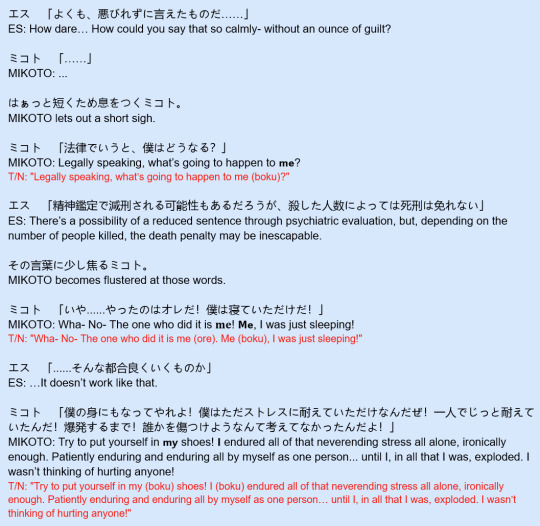
es never questions mikoto's (オレ) 'confession', nor his weak and generic responses to being pressed for further details, nor really the logistics of a self-state alone committing murder. in fact, mikoto's (オレ) vague descriptions of his acts only seem to convince them further.
when es seems thoroughly convinced by the confession, mikoto (オレ) once again checks with where es is at with their ruling, allowing him to gauge his next course of action with his interrogation strategy. after learning that es believes the conventional approach to these situations would be capital punishment, mikoto panics (オレ).
(as per usual, this response is likely both because he (as a dissociated part of himself) genuinely feels mortified at the idea of his normative self being punished for things his normative self 'did not do' (despite the fact he only gets the impression he has an innocent, normative self because he has psychologically removed all his shameful acts from that mental construct), and because he would definitely rather not physically die or be punished as a human being — the ideal is that he is able to blame something that does not really exist or exists ‘outside’ of his normative self, to avoid being punished or forced to accept his intolerable acts as his whole self's.)
in response to es' unresponsiveness to the notion that normative 'mikoto' should be let off and go unpunished if it was 'only ore's (オレ) fault', mikoto (オレ) finds himself defending, and spinning sympathy for his normative self.
first he (オレ) claims his normative self was 'asleep' for his murders, emphasising his uninvolvement, but also vulnerability. when that doesn't work, he (オレ) shouts at es to empathise with 'mikoto's' position, drawing attention to how pitiful, alone, well-behaved, and sensitive mikoto is. he highlights how mikoto’s circumstances were all stacked against him, and how despite everything, he always sought to do everything right, to comply, and to act natural, but how it all just wasn’t possible.
the worst things mikoto (オレ) allows himself to associate with his normative self are the acts of wishing for a being that could stand up against his abuse, and of 'giving birth' to his 'other self'. even then, however, mikoto (オレ) emphasises that the birth of his 'other self' is not something he could have not done, and maintains that, regardless of his violent fantasies, 'he' never truly wanted, nor had control over, the perpetrated acts, outbursts, and expressions he attributes to ‘not-mikoto’.
i have no say on how far mikoto truly believes in 'his' uninvolvement and lack of control; i find all interpretations to be compelling in their own right. he may truly believe he didn't have any control over himself and that these were not his acts, due to how ostracised from himself and dissociated he feels. he may only emotionally believe it, as he cannot bear to imagine these were his acts and thus clings to this story he has conjured to reassure himself that these acts were not his own. he may also simply just want to believe it and have it be taken as truth, and presents it as such regardless of any doubts or conflicts in his mind, seeing as any dwelling on or expressions of ambiguity could be fatal in these circumstances.
nevertheless, it's a convenient reality to propose and protect himself with, and one that he does.

in response to es buckling down about the conventional legal approach to these matters (and bringing attention to the fact that human life was lost), mikoto (オレ) panics even further, and implores es to approach them as ‘themself’.
i find that by drawing attention to es' judgement as an individual, rather than an agent of law, mikoto (オレ) pushes them emotionally off-balance and distances them from their typical desire to be objective and ruthless as the warden, giving them an uncertainty they betray in the tone of their response. this plea also encourages es, in their emotionally vulnerable state, to approach him (or more specifically, the victimised 'mikoto'), in turn, as a person they've come to know and grown attached to, likely making them more sympathetic and prone to forgiveness to preserve 'mikoto's' wellbeing (consider how Milgram's audience generally buys the idea that mikoto is a helpless victim, and feel bad at the notion of not forgiving him, especially if that means that, as mikoto (オレ) alludes to earlier, normative 'mikoto' will vanish and only his 'other personality' will remain).
ultimately however, it's interesting to note that despite the fact that es is ultimately uncertain on any strong conclusion on if mikoto's account of events means mikoto should be forgiven (as this judgement is the audience's job), they are never seen to question — nor does Milgram encourage the audience to question — mikoto's binary, his claims that he was possessed by his other selves and unable to control himself, or his claims that his other selves are 'not him'.
this manner of approaching his crime — seeing him as a person who, somehow, operates fundamentally differently to others due to his diagnostic label — echoes the sentiment kotoko proposes when giving him the DID diagnosis in Trial 1. es even reiterates it, almost verbatim. however this time, because mikoto has been able to adapt to his circumstances, he has been able to use the Neoplasm interrogation to take control of, play up to, and reinforce the models applied to him as a prisoner and person labelled with DID to guide the audience's discourse around his crime and es’ view of him, in his favour this time.
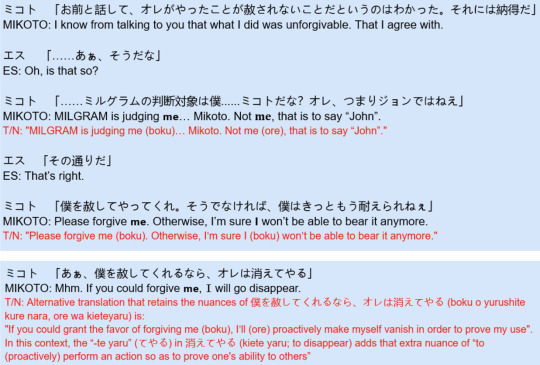
by echoing es' own language and using their preconceptions against them — calling himself 'john' for the first time when concluding his pitch and strategy for forgiveness — mikoto aligns himself with es' stigmas and belief that mikoto (オレ) is a distinct entity from mikoto that must (and can) be defined, and reframes this to guide es' approach to judging, reinforcing the illusion that mikoto's acts were not perpetrated by himself.
i find it very compelling that mikoto's ultimate argument is to promise that if he is forgiven ore (オレ) will 'disappear', since i find that this argument echoes and manipulates how the insanity defense is constructed in certain parts of the world; he makes it out that he was not in control of himself and therefore cannot (or at least, should not) be held legally responsible or punished for his acts, but also that he does not have to be removed from society for being unable to be held responsible, because the mental illness that perpetrated those acts has been identified and is going to vanish imminently.
(this is another way mikoto's ‘binary’ is practically and psychologically useful. by framing himself as only having two personalities, he makes it seem that by 'disappearing' his scapegoat part, mikoto will only have one personality left, making him, seemingly, be 'normal' again, not only no longer associated with a crime or poor behaviour contained within the personality, but also longer be mentally ill or have multiple selves at all. this helps when it comes to the verdict — i'm sure some insane people saw ore (オレ) disappearing through magical lobotomy as a good thing and as his disorder and disruptive behaviour being 'cured' — and also helps mikoto cope with his identity, dissociating himself from everything he cannot tolerate, and labelling it as more-or-less outside forces that do not have to disrupt his sense of self.)
ultimately, mikoto, functionally, promises that from now on, he will always be in control like anyone else, and that he will now be normal, functional, and socially acceptable, like he 'always has been', and always strives to be, unable, in his survival-driven state, to acknowledge or accept the extent of his self beyond his normative identity constructs, nor the damage that his intolerance towards himself has had on his mental health.
based in his well-established dissociative coping mechanisms that have kicked into overdrive thanks to the stress and social pressures of Milgram, and the circumstances of Milgram in general, mikoto finds himself increasingly desperate to entirely cut himself off from and dissociate from everything he cannot tolerate about his acts and that he hates about himself. by conforming himself to labels coercively applied to him, gauging the expectations of authority figures, and changing himself to appease those in power, mikoto makes attempts to secure his safety to do so, successfully discouraging the warden and audience from interrogating and blaming the normative 'him', and instead directing the heat and blame to his ‘other’ self that can bear the label of ‘murderer’, and protecting his normative self from shouldering the responsibility for his crime that he cannot bear — or survive — confronting
conclusion / tl;dr:
mikoto is a highly adaptable, socially conscious character, who comes from a culture that values functioning, social cohesion, and conformity. due to how he has developed in his environment, mikoto finds himself prone to repressing and disowning parts of himself, including his anger, his socially unacceptable acts, his overwhelming internalised shame, the fact that he struggles with his mental health, and the fact that, under the pressure of his life and expectations, he commit mass murder, amongst other things. this leads him to display dissociative tendencies, such as feeling like he is 'not himself' at times, or that his acts were not perpetrated by 'him'.
upon being taken to Milgram, his normative reality-illusion that is phobic of all intolerable acts and parts of himself is challenged violently, and after being triggered very severely and voted unforgiven in the first trial, mikoto finds himself in a very vulnerable social and mental spot, and is unable to maintain a sense for himself that he is normal and okay. this leads him to feel 'not like himself' a lot more often.
towards the end of the first trial, due to kotoko's suggested diagnosis in attempting to explain his strange behaviour, figures of authority around him (es and the audience) begin to apply the label and model of DID onto him. with this came the characters' and audience's stigmas, preconceptions, and preestablished narratives around DID, which, due to always reading the room and hearing the audience's voices, mikoto becomes attuned to, which influences his character development, self-image, and way in which he begins to understand and frame his crime to himself and others.
mikoto, as a socially vulnerable person with a weak sense of self, begins to introject narratives around himself, his suffering from mental illness, and his having DID, which impacts how he engages with the other prisoners (mainly by self-isolating and assuming they will be or should be scared of him), and relates to himself (wherein he begins to internalise a belief that he has other, uncontrollable selves that are dangerous and wrong, and shames and abuses them for being that way).
mikoto also, having internalised this, acts according to this way of understanding himself during his Neoplasm interrogation, and performs himself according to conventional understandings of overt personality shifts to distinguish his 'other' selves (that are defined by their distance from his normative demeanour, and their conformity to Milgram’s expectations around his identity), and uses his high social consciousness, responsiveness, and the expectations es demonstrates according to their understanding of how he as a 'person with DID' functions, to get them on board with the assertion that the normative 'mikoto' should not be held responsible for his crimes, and securing for himself a forgiven verdict without challenging the warden’s assertion that he commit murders, allowing himself to protect himself from further abuse and interrogation.
this strategy has the added benefit of reinforcing to mikoto his own desirable belief that the ‘him’ that considers 'himself' is guilty of nothing that could warrant criticism or scrutiny, and that everything intolerable he has done and is that he been forced to face is 'not actually him', and will imminently vanish from his life, reassuring him that he may have a chance to escape Milgram physically and relatively psychologically unscathed, to continue self-destructing in repression and overwork, like he is expected to, in peace.
in this way, mikoto's DID label, although abusively established and used to dehumanise him, becomes a valuable tool for getting himself out of a murder charge that he would otherwise not be able to bear confronting, or make a compelling argument to excuse himself for. by conforming to rudimentary understandings of DID and manners in which people with DID have been dehumanised, mikoto is able to present and see himself as a binary of selves, which becomes vital not only for protecting himself psychologically, and allowing himself to act in the ways Milgram requires him to without entirely shattering his normative identity, but also for convincing others that his psychological and coercively-applied-to-him binary is practical and 'real', allowing him to physically escape punishment for his acts, and assure himself and others that his other 'self' that he hates and blames for all his flaws and humanity, can be separated from him and 'vanished' for good.
epilogue / reflection
real ones know how much this essay made me want to die. i seriously didn't expect it to be so long i promise. i don't know what happened. it regularly brought me into fits of despair. but it's done. i'm glad i wrote it but i'm also so glad it's over.
i'm never writing on this dipshit again. sayonara you weeaboo shits.
(^ this is a joke. but i don't think i have anything else to say about him at the moment! i think this and my other essays really might be the vast majority of my views on his presentation. i'll probably have more to say come T3 but, for now, shrug.)
as always, please let me know if any of this is incomprehensible (whether thats grammar, my word choice, or my trains of logic). i am very happy to clarify and reword bits, it is important to me that my essays can be understood by anybody!
and, congratulations for finishing, you have read very almost 10k of non-stop mikoto analysis. go drink some water and take an eye break. please. for me. thank you!

#kostik speaks#mikoto kayano#milgram#milgram analysis#milgram theory#john milgram#as always#feel free to agree or disagree or pick apart where my logic or conclusions are flawed. please dont see 10k and be too scared to argue#im just verbose. i like long essays. ive 100% missed things. and im 100% not a perfect unbiased analyser. please feel free to chip in#talk to meee about your takesssssss.... i love deconstructing DID rep and reception. heart#ok go my true. im so sorry everybody#edit 6 jul: rewrote and reframed parts of section 5 because the tone and implications were off#also did some word replacement to clarify intended subtext (i forget not everyone reads ego exclusively in the freudian sense)#i am happier with this now. wahu!
65 notes
·
View notes
Text
what up i’ve been obsessed with would you fall in love with me again like every other person on the planet and i can’t stop thinking about penelope’s final verse
she’s so angry; angry that odysseus would dare to suggest that her love for him has faltered or his actions were enough to destroy it. she’s been waiting, working her fingers raw unweaving her shroud every night, not sleeping as the suitors camp inside her home; every day a threat to her and her son, to her kingdom if an unworthy man - and they are all unworthy - should take the throne. she knew they wouldn’t wait forever, that at some point her deception would be realised; her dedication to her husband means she is at constant risk and the first thing odysseus does when he sees her - if this even is him - is question her love for him?
the very first thing he says (other than her name) is, “i am not the man you fell in love with.” penelope asks him if it’s really him standing there or if she’s “dreaming once more”. once more. she’s felt the cruelty of hope before; has looked at her doorway and seen odysseus the same as when he left (which is probably partly why she’s so shocked by how he actually looks) and felt unfathomable pain when her hopes were dashed over and over again. she asks if he is really her odysseus and he says no
yes, in his mind, odysseus can’t see how he can deserve her love after everything he’s done - the atrocities he’s committed, to himself he isn’t the same man, “i see a man who gets to make it home alive, but it’s no longer you” - but all penelope hears is her husband, the man she loves and waited for, doubts the strength of her love
penelope asks what kind of things he’s done and it must be shocking to hear; his actions so different from the man who left her behind even if he did them in name of returning to her. but when she asks him to move the bed, it’s as much a challenge as it is a test. she’s asking him to prove that he is the monster he claims to be; that if he’s changed so much and become so heartless, he should have no qualms about ripping the symbol of their love from its roots. and it’s also her only way of actually determining if this man who claims to be her husband yet doesn’t take her in his arms, is actually him
“just a moment of labour would bring me some peace” - if he does what she asks, then she will know either he’s changed so much that he’s no longer her odysseus or he’s another fake and was never hers to begin with; that her husband didn’t just stand in front of her and claim she can’t love him as he is. but she’s done. she was already willing to die when she stood behind the twelve axes she challenged the suitors to shoot through. she’s so tired. she just wants it all to be over
“only my husband knew that, so i guess that makes him you” - i guess. even after telling her something only odysseus and her knew, penelope’s still not convinced that it’s truly him. how many men came to her door claiming to be her long lost husband, banking on time and distance to dull memory of his face and voice, on her longing and desperation for odysseus to blind her into believing them?
but if this is her husband? if the man she’s loved through decades of absence has finally returned to her?
“i will fall in love with you over and over again” - an exhausted promise, the core of who penelope is and how she feels; assuaging his doubts and his own clear pain
but
“no matter how long it’s been, you’re mine. don’t tell me you’re not the same person, you’re always my husband” - penelope is screaming at him; how dare odysseus say this to her? dismiss her love and her suffering? he saw the men outside, he’s smart enough to know what they were here for and instead of apologising for being gone for so long, instead of begging for forgiveness for inadvertently putting her and their son at risk, instead of embracing her and putting an end to her torment, odysseus doubts her
“and i’ve been waiting, waiting” - the tone shift of penelope screaming at him to lamenting how long she’s been waiting is heartbreaking; it’s quieter as she gets lost in the pain of her grief, her anger failing as she recalls the memories of her long years of solitude. odysseus tries to call her back with his gentle “penelope” - such a contrast to his own exhausted anger at being asked to destroy their marital bed now that he understands why she asked that of him - but she can’t hear him; she’s too trapped in the memories. he tries again, still gentle but more insistent, and this time she does hear him and her anger comes rushing back along with her grief. her “waiting, waiting,” becomes almost accusatory; she’s been alone for so long and it’s bc of him, bc he wasn’t there, bc he left her waiting
that abrupt “oh” at the end of the verse isn’t just a vocalisation; in that moment, she’s realising that she has realised that he truly is odysseus. she knew it was him before she even processed it. she wouldn’t be this angry if he were anyone else; love and grief and anger coalescing in one single divine moment where penelope finally believes her odysseus has returned to her
“for you” - she’s been waiting and waiting, years turning to dust, her sleepless nights and days spent living in fear and preemptive grief- and it was all for him. odysseus is actually here. which means her waiting is over
“how long has it been?”
“20 years”
“i- i love you”
#disclaimer maybe that ive never read the odyssey but this is more of a song analysis than anything else#and yall know how much i love my analysis#penelope has every right to be angry at odysseus even if it wasnt his fault for being gone so long#logic doesnt trump emotion#she will forgive him - of course she will she loves him too much - but she deserves her anger and grief and blame#20 years of being left alone to raise their son and rule their kingdom#3 years of not sleeping to unweave her shroud and hold off the suitors#i cant imagine how exhausted she must be#and the first thing his husband does upon his return is doubt if she can still love him? after all that?#id throw hands penelope a better person than me on god#she couldve stooped to his level; couldve become ruthless and denied odysseus to protect herself from the pain of forgiveness#but her love for him is stronger than the pain she felt without him#this is purely from penelopes pov by the way i know odysseus was kinda justified in asking#but still#dude think it through#coming out of my cage and ive been doing just fine.txt#talk meta to me#ruthlessness is mercy upon ourselves#meta#epic the ithaca saga#epic the musical#epic odysseus#epic penelope#the epic saga#epic saga#jorge rivera herrans#the odyssey#the ithaca saga#penelope of ithaca#odysseus
129 notes
·
View notes
Text
Wouldn't it be funny, if in this scene she already has one of her braids cut off and that's why she looks horrified?? Because seriously where the FUCK is the other one??!!
Oh, it's hidden on her back?? Not when she's in this position it won't because, y'know, PHYSICS!!

WHERE IS IT (ノಠ益ಠ)ノ彡┻━┻

#arcane analysis#jinx arcane#they hiding something from us#ong logically the other braid should be dangling down as well#i am going insane
154 notes
·
View notes
Text
I know it's well-understood at this point that Kirk/Spock is much more of a nerd4nerd ship than a nerd/jock thing, but it's just been kind of percolating around my mind that both of them aren't just space nerds but space nerds who were personally bullied.
Like, 18-year-old Kirk was targeted by an older bully who combines "total asshole" with "the most grating man in existence":
MCCOY: Well, yeah, I'm beginning to feel a little bit picked-on, if that's what you mean. KIRK: I know the feeling very well. I had it at the Academy. An upperclassman there. One practical joke after another, and always on me. My own personal devil. A guy by the name of Finnegan. MCCOY: And you being the very serious young— KIRK: Serious? I'll make a confession, Bones. I was absolutely grim, which delighted Finnegan no end.
This was five years after Kirk survived a genocide, btw, and likely well before his stint as an Academy instructor known to be strict and demanding (which is the period the "stack of books with legs" description of him comes from). By the time he's 33, fifteen years after all this, it turns out one of his deepest fantasies is just beating the shit out of his bully, but only if he can do it According To The Rules (the replica of Finnegan sneers, "Always fight fair, don't you? True officer and gentleman, you").
Spock, meanwhile, is viciously targeted by his Vulcan peers for being biracial from at least age 5; he's described as being tormented by other boys by that age, and "at home nowhere except Starfleet." I think he'd have been 18 or 19 when he left for Starfleet and it's... the least bad of his options, but he seems to have spent his entire career among humans and being persistently subjected to raw racism and profound disrespect for his culture at every turn.
Like, their histories of being metaphorically shoved into lockers are not identical or anything, but I think it's interesting that they both have them.
#i feel like kirk and mccoy are generally seen as more temperamentally aligned despite kirk being emotionally closer to spock#spock representing cold logic and kirk and mccoy as the passionate emotional ones#but i feel like a) spock is wildly emotional just repressed. and coolly utilitarian in philosophy. and usually undemonstrative.#b) mccoy is highly intelligent and sometimes VERY much the voice of reason#(not typically cool rationality but certainly reason - he puts together clues that the others don't see on multiple occasions#he's not as easily derailed by obscuring details or over-cerebral analysis paralysis as the other two imo)#c) but mccoy sometimes struggles with the really big emotional shit and spock is more on kirk's emotional wavelength there#(this is especially obvious in conscience of the king and turnabout intruder but not only there - in both mccoy resists seeing#the full horror of the violations of the most basic rights that kirk has endured while spock is much more sensitive to those things)#and d) kirk is emotionally expressive but typically more cautious and measured in judgment than either of the others#more likely to formulate positions in terms of philosophical principles than mccoy's kneejerk sense of decency#(which sometimes is exactly what's needed and sometimes disastrously lacking in rigor and reflection)#or spock's often brutally utilitarian focus on outcomes that runs roughshod over... like. everyone.#that's why kirk is the mediator; he's not at the exact midpoint in every dispute#but broadly his personality and strengths/weaknesses fall pretty evenly between spock and mccoy#(interestingly i think this is especially noticeable with kirk's infamous seductions - which are rarely motivated by simple desire#they combine the focused perception and expressiveness of mccoy and the brutally self-denying calculations of spock#when sylvia exclaims that he seems warm and passionate but his mind is cold it's like... yeah. softly lit femme fatale james t kirk#it's like the unholy side of kirk's overall approach borrowing pretty equally from both mccoy and spock)#ANYWAY the point is that i don't think kirk is actually more similar to mccoy than he is to spock#and in particular his tendency to repress the horrors and focus on useful concrete action are very akin to spock#long post#anghraine babbles#star peace#otp: the premise#c: who do i need to be#c: i object to intellect without discipline#star trek: the original series#anghraine's meta
142 notes
·
View notes
Text
I feel very conflicted with my opinions on Dazai. He is not my favourite character, he never was. But I feel a weird sympathy for him at times when he is seen as a total villan?
He is not evil. I don't know how people mischaracterize Dazai as evil.
With the recent chapter 122, there are a lot of people who hate Dazai and want him to die for what he did to Akutagawa. For a second, I felt like that too. I can't see children being abused, not that anyone wants to see it, but I feel very emotional whenever I see hurt children. My first instinct was to hate Dazai too.
But Dazai isn't a responsible adult. Dazai himself was a 16 year old, trying to find meaning in life, guiding a 14 year old into the dark side. This isn't an older, experienced, manipulative man who knows what he is doing but a teenager who thinks he knows everything. Dazai himself ran away from home and was suicidal already at the age of 14, just the same lonely child as Akutagawa. But he found "meaning" in the Port Mafia, or at least trying to. When he gave his word to Akutagawa that he'll "certainly" find meaning in life, I don't think it's manipulation, Dazai himself believes in it. An adult putting you in a dangerous climate is very different than when your cousin tells you to smoke because "it's cool, dude"
I am NOT defending Dazai's abuse of Akutagawa, as I said before, I am not some Dazai superfan (which, Dazai being portrayed as completely innocent also irks me!). I want there to be balance in the conversation surrounding it.
Dazai AND Akutagawa were children, they were both trying to find reasons to live. They grew up in the Port Mafia. We have seen how cruel and unhinged Dazai can be during his time in the PM. We have seen Akutagawa, and his constant internal battle with good and evil. These two are not some heartless creatures, both of them are changing for the better. Dazai found proper guidance in Oda, and taking his words, he became a better mentor to Atsushi. Akutagawa was left in the PM alone, so he grew stone cold and ruthless until he saw the light again, because of Atsushi (in recent chapters his eyes are literally lighter)
Does Dazai feel bad for what he did to Akutagawa? No, at least not now or we don't know what he is feeling, I don't trust anything that comes out of his mouth. But he doesn't HAVE to feel bad. That's what morally grey characters are. If Dazai immediately repented for what he did, it won't be realistic or true to his personality. Yes, he is in the ADA, but he is NOT some great person just because he chose to leave PM, even he himself knows that! That's why he felt so shocked when Atsushi called him a good person. Dazai knows he is not a good person and that's why he doesn't repent for what he did to Akutagawa. We don't accept our mistakes easily, not when we thought of them as means to an end. Dazai truly believed what he did to Akutagawa was a pro and not a con. If he will change that perspective now, is more about his own character arc.
Akutagawa was just a kid, influenced by Dazai. He wanted to impress him, like we do to our parents. Like we fight tooth and nails to defend our parents mistakes and sometimes even abuse. He isn't ready to accept what Dazai did to him was wrong. But when he saw how Dazai treats Atsushi, I am pretty sure he felt like dying. Because imagine your parent treating their step children better than you, that's how I see Aku's jealousy to be like. Dazai was his mentor first, why is he praising and coddling this random guy who just came into his life? But Akutagawa doesn't hate Atsushi in particular, he hates the treatment he gets from Dazai. I think considering what's happening in recent chapters, just like how Atsushi overcame his conflicting feelings towards the headmaster, Akutagawa will do the same with Dazai. (Edit: in chapter 123, Aku replaced Dazai with Atsushi in his head)
Akutagawa carried the cycle of abuse, doing the same thing Dazai did to him to Kyouka, another 14 year old (she trained since she was even younger). But unlike Dazai, when Kyouka is finally free from PM, Akutagawa doesn't want her to come back to him, he stops abusing her, Dazai still is awful and manipulative with Akutagawa at times. He feels happy for Kyouka, because HE wanted someone to rescue him too. Of all the abused children, Akutagawa was the one who never got rescued. Akutagawa was abusive to Kyouka, it can't be erased because of his own tragic past, he also hit Higuchi and seem to answer everything with violence. This is why the cycle of abuse is so painful, Akutagawa was taught to be this way and he CHOSE to stay this way, until he made the bet to stop killing people with Atsushi. I don't think Akutagawa will ever go back to his own ways after this arc is over. You can't undo your past, you have to move on, keep walking, keep living and trying to do better next time.
I want Dazai to get some good old karma! I want him to face the consequences for what he did to Akutagawa. I want Atsushi to have conflicting feelings towards Dazai but I don't want him to hate Dazai. Atsushi understands people on a deeper level, he's going to try and change people no matter of their pasts. Akutagawa and Dazai aren't going to be on good terms ever, that can't happen. I want Dazai to stop treating Akutagawa like shit and I want Akutagawa to stop wanting validation from Dazai.
Now the final verdit from me, is Dazai evil? No. Is Dazai a good person? No. Can Dazai change? Yes. Did Atsushi have a huge impact on both Dazai and Akutagawa? Yes. Is Akutagawa already changing? Yes. Can Dazai be vile? Yes. Can Dazai be soft? Yes. Does Dazai deserve to die? No.
Morally grey characters cannot be good or evil. They are grey. Let them be grey. We shouldn't erase their bad sides and we can't act like they didn't do good. BOTH Dazai and Akutagawa are morally grey characters. They are just different types of grey. Akutagawa is speed running to the light and Dazai is stuck in the middle of the grey. People have the ability to change for the better or worse, no matter who they are.
Now let's be clear: Dazai and Akutagawa are not the same. Dazai is a much worse person than Akutagawa, what he did was not excusable considering he doesn't feel bad for what he did. That is why he cannot be a good person. Dazai isn't a victim of abuse like Akutagawa either, although I do believe he had enough problems already to screw his brain before he moved to PM, living in PM isn't exactly an environment to raise someone right, who is constantly called "the demon prodigy". He IS the demon prodigy.
No matter what Dazai did in the PM, I can't hold a child to the upmost standards. There's a reason why Juveniles have a seperate court. Juveniles shouldn't get death penalty. Dazai committed heinous crimes as a child. But he is NOT the only child who did this. Everyone in PM has committed several crimes. It's a fictional story after all. Because of that I can't HATE Dazai. I believe all children deserve to be saved, to be given a second chance. Dazai went to the ADA and started to use his dark sides for the good. I can't call him evil for his past, when he was a suicidal kid, mentally ill, having a god knows what tragic backstory. Yes Dazai was smarter than an average teenager, but if you have read "The Day I picked up Dazai", you know despite all that; he was just a kid.
A kid abusing another kid cannot be any less tragic. There is not one childhood loss. It's TWO childhoods lost.
(ps: I was scared to post this lol 😭😭😭😭)
#me hating teen Dazai and crying for him is an avg Tuesday#everything surrounding Aku and Dazai makes me feel sick to the stomach#plz be sympathetic to BOTH teen aku and teen dazai#it's all so tragic#i kept crying in between so maybe i wrote more with emotions than logic#i think Dazai needs fo be drop kicked at least#this is not a defence of Dazai btw#bsd#bungo stray dogs#bungou stray dogs#bungou sd#bsd dazai#bsd akutagawa#bsd atsushi#bsd thoughts#bsd chapter 122#bsd analysis
60 notes
·
View notes
Text
Am I the only one who is thinking that Gales underwear is enchanted to keep him from getting too worked up or turned on? That man is doing everything to stop the risk of explosion. If he isn't also doing the magic equivalent of suppressing his libido, then he's gotta be doing something else for it. (Or just some seriously extreme levels of self control)
As far as I'm concerned his underwear is a chastity belt and he disenchants it once the orb is stable.
More in depth ideas under the cut (it could've been a different post entirely but it's too late now)
I've seen most people say that the underwear is actually what is giving him abs and I have some thoughts.
Hear me out. We all saw the posts a few years back about male actors starving themselves and doing unhealthy practices to gain that muscle that we see in movies. Take Thor for example, Chris Hemsworth spent a lot of time barely eating and drinking a shit tons of water to achieve that look. I'm not saying Gale would be anywhere near that level but it's something to think about.
He's self conscious, trying to fit in, and in a relationship with a literal goddess. To me that all adds up to him probably having been quite fit, even if visible muscle wasn't the look he had, he still would've been very capable and in good shape.
Then he very suddenly has this thing in his chest that is eating him alive, his relationship has ended without his full knowledge, and he is quickly shunned by everyone around. That would take a huge toll on his body, and he probably would get pretty depressed. Personally I'm a lose my appetite kind of depressed so I see that being pretty reasonable with Gale. Maybe he makes big meals so he can try and feel normal but enjoying it just isn't the same when you're alone and in pain. And as much as Tara tries to help, it just isn't the same. To add to that, his stress levels are at an all time high, which can also account for sudden loss of body fat, giving him the look of an action movie lead, without any of the intentional effort.
This is all just my own head cannons / speculation.
Personally I adore Gale for how he is in the game, but I am not against anyone who has different opinions. This is not intending to cause issues or arguments so please refrain from doing so 🩷
#this is all my personal headcannon#if this makes you upset please do us both a favor and block me#im just trying to think logically about it and this is where my brain has ended up#god i hope im not making myself sound like an ignorant asshole#Gale Dekarios#character analysis#character breakdown#bg3 gale#bg3 gale dekarios#gale of waterdeep#thoughts
66 notes
·
View notes
Text
going just a little insane about the don't forget theme being revealed as part of a hymn… its heavy presence in the church dark world after being mostly absent from chapters 2 and 3… the way the 'guiding light' leitmotif that ties chapter 1 together ends up being a worship song… the way kris used to play the piano at church… the way they take back control of their body to play on the organ… noelle and her Angel symbolism…
'don't forget' is more than just a source of comfort and a 'you can always come home when things get bad,' it's the manifestation of god's love and glory protecting you from the darkness, it's being told you can come back to god's light and trust you will be safe
#something something GOD i love it when media learns hard into religion like this#genuinely whatever the hell deltarune is doing with religion rn is phenomenal and i am devouring it#it might be a stretch to claim that the hymn is the actual origin of he 'don't forget' theme but#i feel like the fact that it's a hymn implies that it's a very very old song#and logically it's something that kris would've grown up hearing right?#which makes sense as to why it's all over chapter 1— the first dark world is very much shaped by kris's memories and experiences#and the 'don't forget' theme (if we agree that it's a prayer they grew up saying) would understandably be something they reach for#— for comfort in a confusing dark place#right?#right????#idk tell me if i'm being insane#utdr#deltarune#deltarune chapter 4#kris dreemurr#kris deltarune#deltarune analysis
35 notes
·
View notes